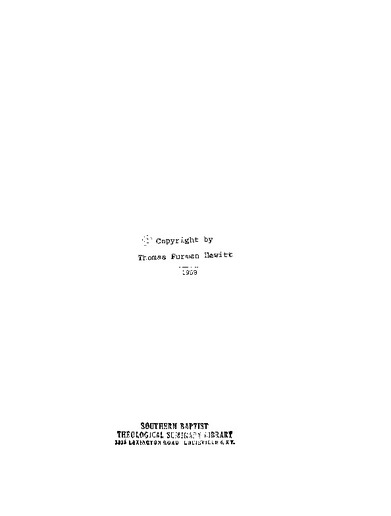| dc.description.abstract | Few affirmations of the Christian faith generate as
many questions and doubts as the belief in the efficacy of
petitionary and intercessory prayer. Does God respond to
men's prayers? If so, how? The primary purpose of this
study is to examine the various ways of understanding intercessory prayer--that is, petition which involves a third
party--found in the writings of twentieth century Protestant
theologians. An evaluation of both the strengths and weaknesses of each of the four views represented and the
biblical presuppositions about prayer leads to a statement
of the author's own interpretation of intercessory prayer.
Part One of the study is composed of two chapters
dealing, in brief compass, with the presuppositions of
intercessory prayer in the Old and New Testaments. These
basic assumptions are; the electing love of God, the
sovereign control of God over the material order, the personal nature of God--especially the thought of God as Abba, and the role of the Holy Spirit in prayer. The gradual
shift away from a materialistic, manipulative view of
intercession is carefully noted.
Part Two is a study of the four major ways in which
the relationship of prayer, God and the world order are
interpreted by twentieth century Protestant writers. The
representatives of the first view, that prayer actually
affects God's actions, are H. H. Farmer and George Buttrick. The second approach is that intercessory prayer consists in aligning the one praying with the will of God; the spokesmen for this view are John R. Rice, the Fundamentalist editor, and Karl Barth. A third possible interpretation is that prayer is effective primarily in and through the one praying; the natural order is viewed as virtually closed to divine guidance. Here the representatives are Georgia Harkness, Harry Emerson Fosdick, and John Burnaby. The last possible understanding of intercession is one which ethicizes prayer into concrete action on behalf of one's fellow man and tends to omit any transcendent dimension. At this extreme are found John A. T. Robinson, Douglas Rhymes and Paul van Buren.
A critique of the above four views in the light of Christian revelation and the present level of scientific knowledge leads to the conclusion that the first and third interpretations have fewer problems than the others. Part Three, then, defends the thesis that there is no justification for dismissing the possibility that God can and does
respond to man's prayers. The objections against which this affirmation is made have to do with the problems of natural law, the doctrine of the wisdom and goodness of God, and the freedom of man.
A secondary conclusion of this study is that the primary mode of God's response to intercessory prayer is at
the personal level, that is, through the one who intercedes.
It is acknowledged that in the final analysis, the efficacy
of intercessory prayer cannot be proved but is an intuitive
judgment of faith. | en_US |

